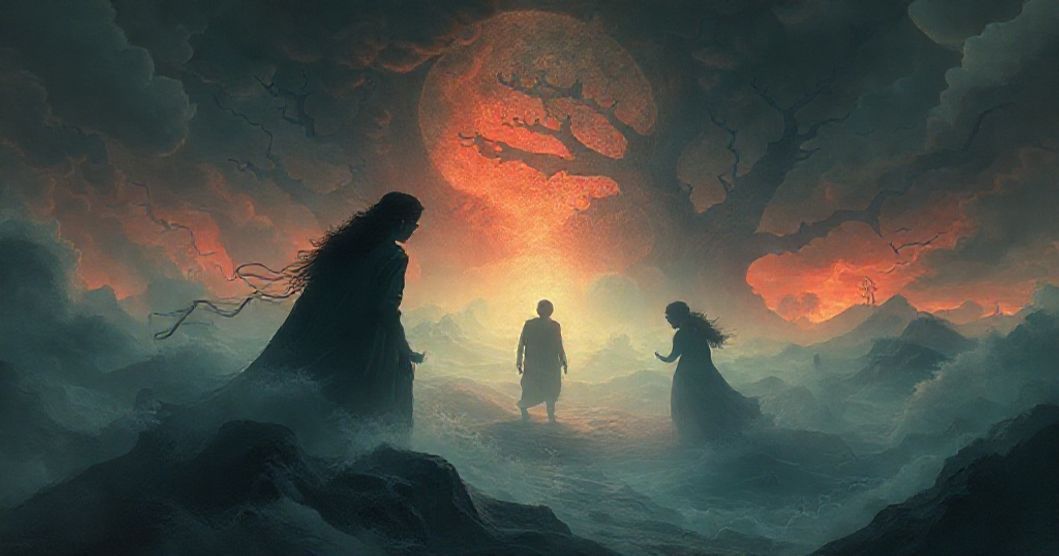Part 1: Dream Presentation
Dreams often serve as psychological mirrors, reflecting our deepest anxieties and unresolved emotions. This vivid nightmare offers a haunting glimpse into the dreamer’s inner world, where familial bonds collide with existential terror. The dream unfolds in a warped version of the dreamer’s hometown, a setting that should feel safe yet becomes a theater of horror. The central conflict arises from three uncles who orchestrate a genocide, wielding guns and declaring a 'new era' of domination. The dreamer possesses two surreal abilities: a 'Doom Indicator' that signals impending death and super speed with space-bending capabilities, suggesting a subconscious need for control in the face of overwhelming threats.
The dreamer attends a courthouse with a shadowy figure—later revealed as a childhood friend—who shares the experience of fleeing the massacre. They discover their grandmothers perished in the attack, triggering a resolve to stop the uncles. The narrative shifts to a barbecue where the uncles appear as illusions, and the dreamer must outrun Uncle α’s gunfire. Finally, the dream ends with the friend’s mother locking the dreamer out, symbolizing isolation in the face of unresolved threats.
Part 2: Clinical Analysis
Want a More Personalized Interpretation?
Get your own AI-powered dream analysis tailored specifically to your dream
🔮Try Dream Analysis FreeSymbolic Landscape: Archetypes and Dream Elements
The courthouse serves as a powerful symbol of institutional authority and judgment, warped here to represent familial betrayal. In dream psychology, courthouses often reflect conflicts over justice or power struggles within one’s life. The three chickens in the coop may symbolize vulnerability and fertility—three being a number of completion or trinity in many mythologies. Their presence in a place of death hints at overlooked or vulnerable aspects of the dreamer’s life. The uncles, portrayed as villains, likely represent shadow archetypes—unconscious aspects of the self or family members who embody fear, control, or betrayal. Their specific names (α, δ, Ψ) may signify their roles as 'alpha' (leader), 'delta' (second-in-command), and 'psi' (psychic or unknown element), reinforcing their collective threat.
The 'Doom Indicator' is a classic dream mechanism for signaling existential dread, acting as a warning system for the unconscious. Its graphic imagery (death visions) reflects the dreamer’s fear of annihilation—perhaps literal or metaphorical. Super speed and space bending represent the dreamer’s desire for escape and control in waking life, where they may feel trapped by family dynamics or life circumstances. These abilities allow the dreamer to outrun danger, suggesting a subconscious belief in resilience despite overwhelming odds.
Psychological Currents: Theoretical Frameworks
From a Jungian perspective, the uncles embody the shadow archetype—the repressed, dangerous aspects of the family. Their collective violence against the 'elders' (elder community) reflects the shadow’s tendency to attack what is 'old' or established, threatening to dismantle the dreamer’s sense of security. The childhood friend, a recurring figure, represents the animus or anima—archetypes of the masculine or feminine within, suggesting a need for integration of lost or repressed parts of the self.
Freudian analysis might interpret the uncles’ actions as displaced anger or aggression toward authority figures, possibly the dreamer’s own father or paternal figures. The 'new era' they declare could symbolize the dreamer’s fear of losing identity or autonomy to external forces. The mother’s upcoming visit introduces a fear of future harm, aligning with Freudian themes of unresolved maternal anxieties.
Neuroscientifically, dreams process emotional memories, and this nightmare likely integrates trauma or stress from waking life. The super speed and space bending may represent the brain’s attempt to 'rewrite' traumatic experiences, giving the dreamer agency they lack in reality. The blurry vision during the second Doom Indicator suggests the dreamer’s struggle to process overwhelming information, a common feature in nightmares.
Emotional & Life Context: Unpacking Family Dynamics
The dream’s core conflict centers on familial betrayal and existential threat, suggesting the dreamer may be experiencing tension within their extended family. The uncles’ roles as 'leaders' of the genocide could reflect real-life power struggles—perhaps the dreamer feels disempowered by dominant family members. The grandmothers’ deaths may symbolize the loss of wisdom or connection to ancestral roots, triggering a protective instinct to preserve what remains.
The 'simulations' or illusions at the barbecue highlight the dreamer’s suspicion of authenticity in waking relationships—perhaps feeling surrounded by inauthentic people or situations. The military mother figure introduces themes of protection and control, possibly reflecting the dreamer’s desire for safety or fear of maternal authority.
Therapeutic Insights: Processing the Nightmare
This dream offers an opportunity to explore family relationships with curiosity rather than fear. The dreamer should reflect on how family dynamics feel oppressive or threatening in waking life. Journaling exercises could help identify specific triggers—such as conflicts with uncles or paternal figures—that mirror the dream’s themes.
The 'Doom Indicator' can be reframed as a warning system for emotional boundaries. The dreamer should ask: What parts of my life feel like 'death sentences'? Identifying these areas allows for proactive boundary-setting.
The childhood friend’s reappearance suggests the need to reconnect with lost aspects of self or relationships. Reaching out to old friends might restore a sense of safety and support.
FAQ Section
Q: Why did the dream feature uncles as villains?
A: Uncles often symbolize authority figures or family members triggering anxiety. Their 'genocide' may represent perceived threats to identity, safety, or family legacy.
Q: What do the super speed and space bending represent?
A: These abilities reflect the dreamer’s subconscious need for control and escape, signaling a desire to overcome overwhelming situations in waking life.
Q: Why did the chickens in the coop matter?
A: Chickens symbolize vulnerability and overlooked aspects of life. Their presence in a place of death hints at unaddressed fears or overlooked family dynamics.
Q: How should I process this dream emotionally?
A: Reflect on family relationships, identify boundaries needing protection, and journal about recurring themes to uncover hidden anxieties. Consider discussing these feelings with a trusted family member or therapist.
